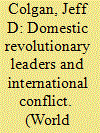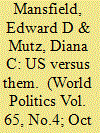|
|
|
Sort Order |
|
|
|
Items / Page
|
|
|
|
|
|
|
| Srl | Item |
| 1 |
ID:
124869


|
|
|
|
|
| Publication |
2013.
|
| Summary/Abstract |
The wide-ranging varieties of capitalism literature rests on a particular conception of banks and banking that, the authors argue, no longer reflects the reality of modern financial systems. They take advantage of the greater information regarding bank activities revealed by the financial crisis to consider the reality, across eight of the world's largest developed economies, of the financial power of banks to act as bulwarks against market forces. This article offers a marketbased banking framework that transcends the bank-based/capital market-based dichotomy that dominates comparative political economy's consideration of financial systems and argues that future cpe research should focus on the activities of banks. By demonstrating how market-based banking increases market influences on the supply of credit, the authors highlight an underappreciated source of financial market pressure on nonfinancial companies (nfc s) that can have a potential impact across the range of issues that the varieties of capitalism (VoC) literature has seen as differentiating national systems. This approach has implications in areas such as labor, welfare, innovation, and flexibility.
|
|
|
|
|
|
|
|
|
|
|
|
|
|
|
|
| 2 |
ID:
124867


|
|
|
|
|
| Publication |
2013.
|
| Summary/Abstract |
There is a strong scholarly consensus that domestic revolutions create conditions ripe for international conflict. Traditionally scholars have treated revolutions as events, after which there is a period of time during which international conflict is more likely. Yet some states experience significant international conflict only during and in the immediate aftermath of a revolution, whereas other states continue to engage in conflict for many years and even decades afterward. This article seeks to explain the persistence of conflict for some but not all revolutionary states by differentiating the concept of revolutionary leaders from that of revolutions as events, both theoretically and empirically. The author shows that existing theories linking revolution to international conflict underemphasize an important mechanism through which revolution leads to conflict: by selecting conflict-prone leaders through the dynamics of revolutionary politics. He argues that revolutionary politics allow leaders with certain characteristics, including high risk tolerance and strong political ambition to alter the status quo, to obtain executive office because individuals without these characteristics generally do not succeed in leading revolutions. Having obtained power, revolutionary leaders have aggressive preferences that make their states more likely than nonrevolutionary states to instigate international conflict.
|
|
|
|
|
|
|
|
|
|
|
|
|
|
|
|
| 3 |
ID:
124866


|
|
|
|
|
| Publication |
2013.
|
| Summary/Abstract |
The article addresses the question of what role formal constitutions play in mitigating intense conflicts over the religious character of the state. In contrast to common views in constitutional and political scholarship, it demonstrates that the ideal of liberal constitutionalism is not compatible with the political reality and types of conflicts that characterize religiously divided societies. Analyzing four processes of constitution drafting in which issues of religious law and religious identity were at the heart of the debate-India, Indonesia, Israel, and Turkey-it argues that under deep disagreement over the state's religious character, the drafters adopt either a permissive or a restrictive constitutional approach. While the former implies strategies of constitutional ambiguity, ambivalence, and avoidance in order to allow the political system greater flexibility in future decision making on religion-state relations, the latter approach uses repressive constitutional constraints designed to limit the range of possibilities available to future decision makers. The article further explores the long-term consequences of the two approaches and argues that (1) permissive constitutional arrangements, more than restrictive arrangements, are likely to promote the democratic functioning of future governments; and that (2) permissive constitutional arrangements may facilitate greater freedom of religion, but they are also likely to lead to greater restrictions on freedom from religion, compared with restrictive constitutions.
|
|
|
|
|
|
|
|
|
|
|
|
|
|
|
|
| 4 |
ID:
124865


|
|
|
|
|
| Publication |
2013.
|
| Summary/Abstract |
Economists have argued that outsourcing is another form of international trade. However, based on a representative national survey of Americans conducted in 2007 and 2009, the distribution of preferences on these two issues appears to be quite different. This article examines the origins of attitudes toward outsourcing, focusing on the extent to which it reflects (1) the economic vulnerabilities of individuals; (2) the information they receive about outsourcing, including their subjective understanding of what constitutes outsourcing; and (3) noneconomic attitudes toward foreign people and foreign countries. The findings emphasize the importance of variations in understandings of the term, as well as the highly symbolic nature of attitudes toward this issue. Individuals who believe the US should distance itself from international affairs more generally, who are nationalistic, or who feel that members of other ethnic and racial groups within the US are less praiseworthy than their own group tend to have particularly hostile reactions to outsourcing. The informational cues people receive are also important influences on their understanding of and attitudes toward outsourcing. Experimental results further emphasize the symbolic nature of attitudes toward outsourcing. Taken together, the results strongly suggest that attitudes are shaped less by the economic consequences of outsourcing than by a sense of "us" versus "them."
|
|
|
|
|
|
|
|
|
|
|
|
|
|
|
|
|
|
|
|
|